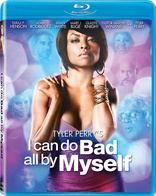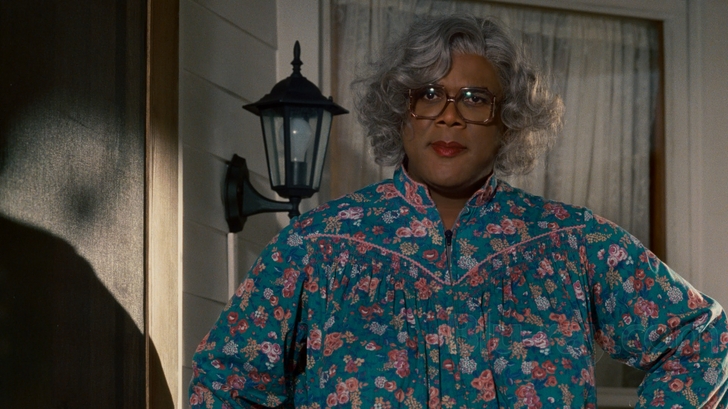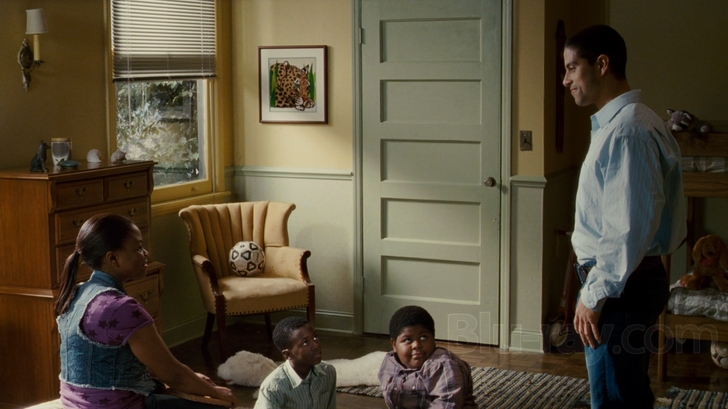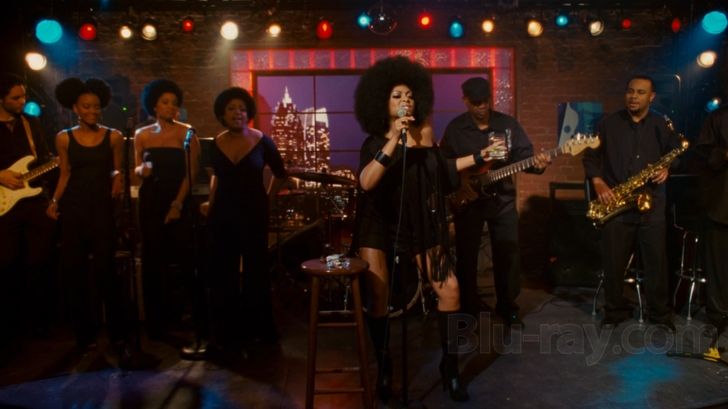I Can Do Bad All by Myself Blu-ray Movie
HomeI Can Do Bad All by Myself Blu-ray Movie 
Lionsgate Films | 2009 | 113 min | Rated PG-13 | Jan 12, 2010
Movie rating
5.6 | / 10 |
Blu-ray rating
| Users | 4.3 | |
| Reviewer | 2.5 | |
| Overall | 3.7 |
Overview
I Can Do Bad All by Myself (2009)
When Madea, America's favorite pistol-packing grandma, catches sixteen-year-old Jennifer and her two younger brothers looting her home, she decides to take matters into her own hands and delivers the young delinquents to the only relative they have: their aunt April. A heavy-drinking nightclub singer who lives off of her married boyfriend Randy, April wants nothing to do with the kids. However, her attitude begins to change when Sandino, a handsome Mexican immigrant looking for work, moves into April's basement room. Making amends for his own troubled past, Sandino challenges April to open her heart. April soon realizes she must make the biggest choice of her life: between her old ways with Randy and the new possibilities of family, faith...and even true love.
Starring: Tyler Perry, Taraji P. Henson, Adam Rodriguez, Brian White, Hope Olaide WilsonDirector: Tyler Perry
| Comedy | Uncertain |
| Drama | Uncertain |
Specifications
Video
Video codec: MPEG-4 AVC
Video resolution: 1080p
Aspect ratio: 1.78:1
Original aspect ratio: 1.85:1
Audio
English: DTS-HD Master Audio 5.1
Spanish: Dolby Digital 5.1
Subtitles
English, English SDH, Spanish
Discs
25GB Blu-ray Disc
Single disc (1 BD)
Playback
Region A (locked)
Review
Rating summary
| Movie | 2.0 | |
| Video | 3.5 | |
| Audio | 4.0 | |
| Extras | 1.0 | |
| Overall | 2.5 |
I Can Do Bad All by Myself Blu-ray Movie Review
This film can do bad all by itself...
Reviewed by Dustin Somner January 16, 2010Tyler Perry is one busy guy. In the past ten years, heís written and developed 12 stage productions, adapted and produced 8 films, directed seven films, and produced two successful television series (including one that recently passed the 100-episode mark). In fact, one could easily argue that Tyler Perry has accomplished something most would deem impossible in the tough-shelled exterior of Hollywood. Heís turned his name into a brand that sells. Time and time again, his films grab hold of the number one spot during the first week of their theatrical release, despite a complete lack of marketing and a largely unfavorable reception from critics. Knowing critics are merely commenting on their own perceptions of a film, Iíve attributed Perryís core success to his skillful writing, which must touch a nerve in his audience. Now that Iíve sat through my first Tyler Perry production (I Can Do Bad All by Myself), Iím completely at a loss for words. Perhaps there was something lost in the transition from the stage to the silver screen, but this was not the work of a skilled writer, and certainly not the introduction I was expecting. Iíll apologize in advance to any of Perryís die-hard fans out there, but I canít understand how a film this juvenile raked in over 23 million in its opening weekend. Itís like stealing money from a baby.

Madea is the clear highlight of the film.
April is a singer at a local nightclub, who drinks cocktails like water and knowingly remains in a relationship with a married man (who apparently pays for Aprilís apartment). One day while enjoying her normal routine of sleeping in past noon, April is awakened by the thunderous knock of the wise-cracking Madea (Tyler Perry dressed as an elderly woman), who caught three children breaking into her house the night before. April recognizes them as her deceased sisterís children, and immediately asks why they arenít with their grandmother (Aprilís mother), who took on caretaking responsibilities when her drug addicted sister passed away. Apparently, the grandmother of the children has been missing for four days, and the only other place they have to go is their deadbeat auntís house. Not long after agreeing to let the children temporarily stay, a Colombian immigrant named Sandino is sent by the local pastor to offer his handyman services in exchange for a place to stay. April seems put out by the offer, but reluctantly agrees to let him stay in her cold basement rather than get on the bad side of Pastor Brian (Marvin Winans). Facing the realization that her circumstances have been drastically altered by the arrival of four new boarders, April must overcome the reality of a situation she was not prepared for, find kindness in the most unlikely places, and learn to finally bury the past in order to embrace the future.
After I completed the film, I was curious how similar this story remained to the 1999 stage play by the same name. Though thereís a shred of consistency in the overall themes, this is almost a completely new spin on the original story, which seems strange given the popularity of the stage production. Every artist should be allowed the opportunity to revisit their work in order to improve the final product, but in the case of I Can Do Bad All by Myself, the end product is a mess. We have a main character who doesnít give a second thought to the disappearance of her elderly mother until itís too late (if someone told me a loved one has been missing for 4 days Iíd take some sort of action), three children who are kicked to the curb by a selfish woman whoís dating a married father, and in the culmination of all stupidity accuses the sweetest guy in the world of being a child molester because he cares about the childrenís comfort and safety. Most of these qualities are meant to show the soul-searching journey April undertakes in a relatively short amount of time, but I suppose I find it difficult to root for a character thatís not merely flawed, but downright evil. I know most fans of the film will attribute Aprilís problems to the abuse she suffered as a child, or the lack of religion in her life, but I canít buy into her sudden transition from resident bad-girl to mother of the year (especially when that transition occurs in a matter of minutes).
Considering this is my first exposure to a Tyler Perry production, I was pleasantly surprised to find one saving grace in the film, delivered by the reoccurring character Madea. Tyler Perry certainly isnít a convincing woman (thankfully), but his quick wit and no-nonsense dialog created several scenes of welcomed comedy relief. In fact, Iíd even go so far as saying the film suffers the most during stretches where Madea is missing. The way she interacts with the children is exactly how the parent of a teenage child would like to respond, but remains compelled to bottle it up. In the case of Madea, the children have to wonder if sheís just bluffing, or legitimately serious about carrying out the punishment she foretells.
Moving on to the actual directing of the film, I was once again let down by some noticeable flaws in the production. First off, the pacing of several scenes lacks an even flow and tends to drag on far too long. One scene in particular occurs when April attends church and begins her ďawakeningĒ. In the special features on the disc, the production crew felt the energy in the church was outstanding, so they didnít want to cut much from the final product. As much as I can appreciate the religious implications of Aprilís turning point, the fact that the single segment ran over ten minutes in length tested my patience. Another disappointing nuance in the pacing department is the huge leap of logic at the end of the film. I wonít give away the semi-sappy conclusion, but given the events that take place in the final fifteen minutes, the sudden ďcelebrationĒ felt extremely forced. I have no problem with the fact that everything turns out great in the end, but the building blocks werenít in place when they should have been. Lastly, thereís one glaring flaw in a scene when Sandino and April go out paddling on a lake. They begin a conversation at the dock as the boat picks up speed, but the next shot of the couple presents them sitting in a boat thatís clearly not moving. The conversation continues from the first shot to the next, so I guess weíre supposed to assume paddle boats come equipped with instantaneous brakes.
I Can Do Bad All by Myself Blu-ray Movie, Video Quality 

Presented in 1080p utilizing the AVC codec (at an average bitrate of 25Mbps), I Can Do Bad All by Myself offers an average visual experience on Blu-ray. The primary reason for my lack of enthusiasm is the marginal rendering of fine object detail which plagues most scenes. The usual suspects are in place to blame the lack of precise textures on an overabundance of digital noise reduction, resulting in a loss of facial textures and the trademark "wax museum" look to most scenes. Even the appearance of tear drops trickling down faces, or the sweat beads on the face of the pastor are obscured by the blatant filtering used throughout the film. On the bright side, the color spectrum appears quite vivid, with deeply saturated hues that bring out the nuances of the neon-lit nightclub, or the crimson robes of the church choir. Likewise, black levels generate a nice level of depth, allowing contrast to easily differentiate between the lighter and darker elements in the transfer, while clearly revealing detail in the darkest of shadows. Adding to the positives, I never detected edge enhancement, digital artifacts, or compression anomalies that might otherwise downgrade what is already a slightly troublesome transfer.
In summary, fans of the film will surely appreciate the improvements over the standard definition offering, but the disappointing use of DNR prevents this from approaching the quality of the best transfers on the market.
I Can Do Bad All by Myself Blu-ray Movie, Audio Quality 

Lionsgate is rapidly becoming one of the better studios when it comes to the performance of their audio presentations. I Can Do Bad All by Myself is no exception, delivering a lossless mix that performs well within a limited range. What I'm referring to when I say "limited range" is the predominance of dialogue and quiet moments that never call for much surround activity, but require exceptional clarity and spacing. In that regard, the mix rarely fails to perform at a high standard, allowing the audience to soak up the film without effort. What ultimately downgrades the audio experience to a slight degree is a flat characteristic to the dialogue that becomes apparent in a handful of scenes. While certainly not an egregious offense within the context of the overall mix, it will be noticeable to the most discerning audiophiles, and contributed to the loss of one point from the audio score.
To switch gears a little, most long-time fans of Tyler Perry are aware of the influence music plays in his stage productions. Based on the special features included on this release, it sounds as if he abandoned the incorporation of music in the majority of his prior film adaptations. During his completion of the screenplay for I Can Do Bad All by Myself, he decided to make the soundtrack a central focus of the film by inserting several musical numbers at key transitional points in the story. Purely from an audio standpoint, the use of music is one of the true highlights in lending the track a more robust feel. You may not have car chases and high-flying stunt work, but the vocals of Gladys Knight and Mary J. Blige work their magic to turn this into more than simply a one-dimensional project.
I Can Do Bad All by Myself Blu-ray Movie, Special Features and Extras 

A Soulful Ensemble (1080p, Dolby Digital 2.0, 10:05 min): As the title implies, this featurette focuses on the main actors in the film, with everyone singing the praises of their fellow performers. If you absolutely love the film this might be a worthwhile supplement, but I found it a bit superficial.
The Power of Music (1080p, Dolby Digital 2.0, 5:51 min): Touching on the influence of music in the film, this sequence includes interviews with various members of the cast and crew as they delve into the particulars of how music helped further the story.
Tyler's Block Party (1080p, Dolby Digital 2.0, 4:41 min): The block party scene at the end of the film was a last minute add-on by Perry, who originally intended the film to end without a huge celebration. This supplement describes the efforts by the crew to create a large-scale celebration with only 24 hours to prepare.
Rounding out the extras, we have a high-definition trailer for I Can Do Bad All by Myself.
I Can Do Bad All by Myself Blu-ray Movie, Overall Score and Recommendation 

I'm hopeful I Can Do Bad All by Myself isn't the pinnacle of Tyler Perry's film career, and more of a misstep in his growing filmography. I'm guessing a production focused more on Madea would bring out the talent in Perry's writing style, but given my underwhelming impression of this first experience, I can't see the point in going back through his catalog to find something worth watching. As far as a recommendation goes, the choice is simple. If you already know you're a Tyler Perry fan, I'd assume anything I say won't sway your opinion of his latest outing, which likely found a welcomed home in your Blu-ray collection. However, if you're not a fan, or you haven't taken the time to watch one of his films, I'd recommend you avoid I Can Do Bad All by Myself, and look for a worthwhile recommendation by a long-time Tyler Perry fan.
Similar titles
Similar titles you might also like

Meet the Browns
Special Edition
2008

Why Did I Get Married Too?
2010

Daddy's Little Girls
2007

Why Did I Get Married?
2007

The Family That Preys
2008

Madea Goes to Jail
2009

Diary of a Mad Black Woman
2005

Madea's Family Reunion
2006

Madea's Big Happy Family
2011

Friends with Money
2006

The King of Staten Island
2020

Everything Must Go
2010

Madea's Witness Protection
2012

Mr. Woodcock
2007

Night School 4K
2018

Switch
1991

A Madea Christmas
2013

To Wong Foo, Thanks for Everything! Julie Newmar
1995

Jumping the Broom
2011

Georgia Rule
2007